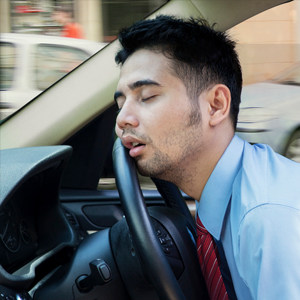
Over the festive season authorities step up efforts to curb the scourge of drunk driving, as this time of year always sees a major increase in road accidents.
While we commend efforts to keep drunk drivers from getting behind the wheel, we shouldn't forget that sleep-deprived drivers also pose a great risk.
Less than four hours of sleep poses greatest risk
A recent study found that in the case of drivers who don't sleep enough, the crash risk is highest in those who get fewer than four hours of shuteye a night.
Researchers equate it to driving with a blood alcohol concentration roughly 1.5 times the legal limit.
Even more concerning is the finding that even those who sleep fewer than seven hours a night are more likely to be involved in a crash – and what's frightening is that many drivers likely fall short of the recommended seven to nine hours of sleep each night.
In an article related to the above study, author Brian Tefft, a senior researcher at the AAA Foundation for Traffic Safety, said, "Being awake isn't the same as being alert. Falling asleep isn't the only risk."
100 000 crashes due to drowsy driving
The US National Highway Traffic Safety Administration recently reported that every year nearly 100 000 traffic incidents can be attributed to drowsy driving, including more than 1 500 deaths and over 70 000 injuries – truly astronomical numbers.
According to the report, most drowsy driving accidents happen between midnight and to drivers who are alone in their vehicle.
Risk factors for drowsy driving include: Sleep loss – even just one hour less than you need; use of sleep aids, anti-anxiety medications or alcohol; driving long hours with few or no breaks, driving alone or with sleeping passengers; and having undiagnosed or untreated sleep disorders.
Signs of falling asleep while driving include:
- Increased blinking
- Longer blink duration
- Slower eye movements
- Swerving
- Slowed reaction time
- Poor decision-making
Coming soon: A drowsy driving test
But there’s good news – scientists are inching closer to a blood test for drowsy driving.
A computer algorithm effectively differentiated between sleep-deprived and well-rested people by picking up changes in the expression of certain genes.
Researchers said the breakthrough might lead to a blood test that could determine if drivers haven't had enough sleep.
Drivers who are even one to two hours short on shuteye are nearly twice as likely to get into an accident, according to AAA Foundation for Traffic Safety data.
Some more important reading:
How to avoid falling asleep behind the wheel
Missing two hours of sleep can double chances of car crash
Image credit: iStock




 Publications
Publications
 Partners
Partners











